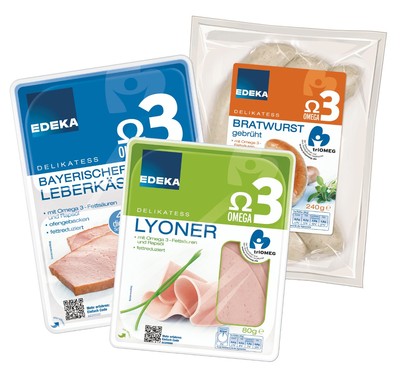Fraunhofer develops omega-3 sausages with no fishy taste
While we all know fatty saltwater fish is one of the best sources of omega-3 fatty acids, many of us don’t eat enough fish. In Germany, few people eat enough fish to reap the benefits of omega-3s, despite being aware of its benefits.
One thing Germans do eat plenty of, however, is sausage. To address the lack of omega-3s in the German diet, Fraunhofer Institute for Process Engineering and Packaging IVV researchers have developed an omega-3 rich food that will appeal to German consumers: the omega-3 sausage.

The sausage will be the first in a range of popular food products with added omega-3 fatty acids, which will launched as an own-brand range exclusively in EDEKA stores.
The human body is unable to produce omega-3 fatty acids itself, so must absorb them from food. A survey conducted by EDEKA showed that Germans know that fish contain a high-value form of omega-3 fatty acids, yet neither women nor men eat the recommended weekly amount of 150 to 220 g of fish.
“We thought that the surest way to solve this problem would be to increase the amount of effective fatty acids in popular foods that people eat in large quantities, such as pizza, pasta, bread, and sausages,” said project manager Dr Peter Eisner, describing Fraunhofer IVV’s approach. “First, though, we had to deal with the fish smell issue.”
While omega-3 fatty acids are virtually odourless in their natural form, they oxidise on contact with oxygen, producing a fishy smell and diminishing their quality. The Fraunhofer researchers worked to develop a process that locked in the fatty acids while protecting them against oxidisation.
“This is what we achieved by means of a special emulsion system,” said Christian Zacherl from Fraunhofer IVV. “It optimally combines the effects of various antioxidants with each other.”
Some of the substances used are directly responsible for oxidisation protection, while others support the effects of the first group, and yet others eliminate substances that accelerate the degradation process in fatty acids.
“The oxygen has to clear a lot of hurdles before it can react with the omega-3 fatty acids. Thanks to our method, the fatty acids remain stable and can be incorporated into a variety of foods. The emulsion can be adapted specifically to individual products. All we have to do, effectively, is vary the number and type of hurdles.” Fraunhofer IVV has patented its technology.
Fraunhofer teamed up with EDEKA to create the enriched sausages, which are produced in EDEKA meat processing plants. The product has been on the market since mid-April as part of the food retailer’s own-brand range. Not only do the sausages contain particularly high amounts of omega-3s, their overall fat content is actually lower than comparable conventional products.
“We use specially processed fish oil that contains by itself over 90% of valuable fatty acids,” said Eisner. “For comparison: the original product contains only 30%. Because we optimised the fat balance in general, EDEKA was able to reduce the total amount of fat. And despite the added value in terms of health benefits, the sausages are just as tasty as their ‘regular’ counterparts.”
FLORA awarded 2025 Innovation Excellence Award from Canstar Blue
Plant based margarine FLORA has been awarded a 2025 Canstar Blue Innovation Excellence Award.
Testing a healthier, less gassy cattle feed
Researchers are exploring a new type of cattle feed that could help to reduce levels of dairy...
Sauerkraut better than raw cabbage for gut health
Sauerkraut could help protect your gut, according to a new UC Davis study, suggesting the...














